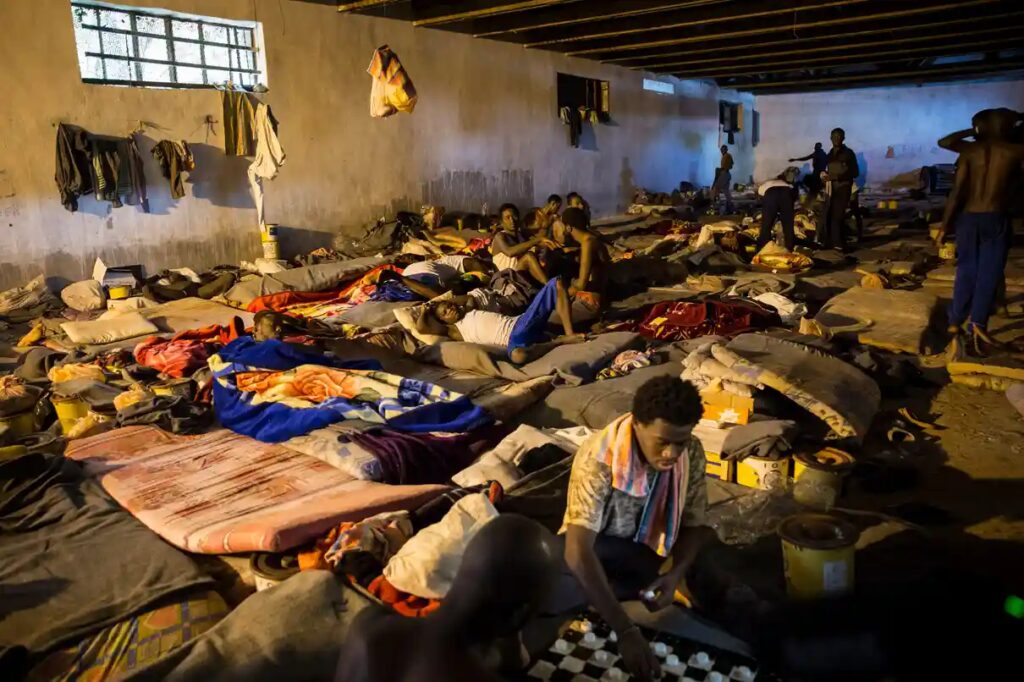
Amnesty International says sexual abuse and beatings rife at camps for those forcibly returned after trying to cross the Med
New evidence of starvation and abuses inside migrant detention centres has been collected from migrants inside seven facilities across Libya.
A report by Amnesty International comes less than a month after Médecins Sans Frontières announced it was suspending its operations at two centres in Libya because of increasing violence towards refugees and migrants.
Amnesty says it has more than 50 fresh accounts documenting severe beatings, sexual violence, extortion and forced labour at the centres, used to house people who have been forcibly returned after trying to reach Europe across the Mediterranean.
In the report launched on Thursday, testimonies gathered between January 2020 and June 2021 allege that guards coerced women into sex in exchange for water and shot at detainees, causing deaths and injuries, while in one of the centres, people were reportedly starving.
Violence towards refugees at Libyan detention centres forces MSF to pull out
Read more
Three women claimed that two babies detained with their mothers had died after guards refused to allow them to go to hospital for urgent medical treatment.
Thousands of refugees and migrants are held in detention centres across Libya, which are nominally run by the Directorate for Combating Illegal Migration (DCIM) and overseen by the ministry of the interior.
The centres in Libya have been the repeated focus of allegations of violence and abuse by UN bodies, human rights organisations and charities. Libyan authorities have vowed to close DCIM centres rife with abuse, but human rights violations have continued unabated in newly opened or reopened centres, said Amnesty.
“The entire network of Libyan migration detention centres is rotten to its core and must be dismantled,” said Diana Eltahawy, Amnesty’s deputy director for the region. “Libyan authorities must close all migration detention facilities immediately and stop detaining refugees and migrants.”
Despite the well-documented abuse, the report added, EU member states continue to back the Libyan coastguard to stop migrants trying to flee to safety and return them to detention centres in Libya.
Between January and June 2021, the Libyan coastguard intercepted about 15,000 people at sea and returned them to Libya during what they labelled “rescue missions”, the report claimed.
There have been dozens of reports describing Libyan coastguards’ behaviour as negligent and abusive, with migrants reporting boats being damaged. In some cases boats were allegedly made to capsize into the central Mediterranean, where the Institute of Migration says more than 700 refugees and migrants drowned in the first six months of 2021.
Refugees and migrants told Amnesty they had seen aircraft overhead or ships nearby that did not offer them assistance before the arrival of the Libyan coastguards. Frontex, the European border agency, has carried out aerial surveillance over the Mediterranean to identify refugee and migrants’ boats and has operated a drone over this route since May. Frontex has consistently denied any accusations that it has not responded to mayday calls and previously said it has done “all that was humanly possible” to reach boats in distress.
Amnesty said European navies have largely abandoned the central Mediterranean to avoid having to rescue refugee and migrants’ boats in distress.
Eltahawy said: “It’s well past time for European states to acknowledge the indefensible consequences of their actions. They must suspend cooperation on migration and border control with Libya and instead open urgently needed pathways to safety for the thousands in need of protection currently trapped there.”
